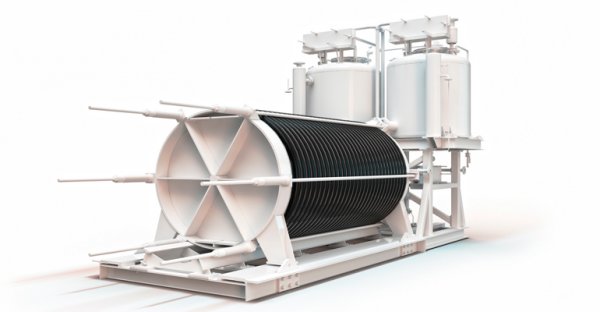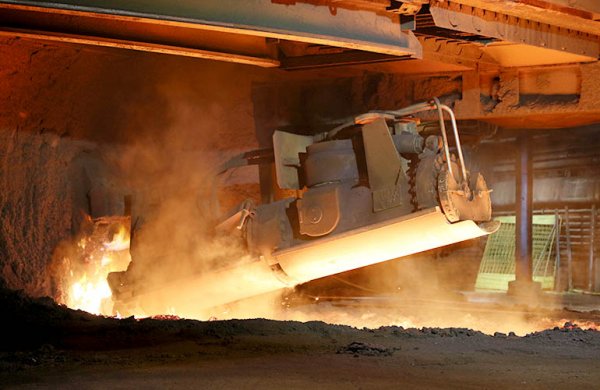In Sweden, Hybrit Development, a joint venture consisting of SSAB, LKAB and Vattenfall AB, has ordered a hydrogen-producing electrolyzer to be produced from Nel hydrogen in Norway and used at a pilot plant in Luleå , Sweden. The breakthrough hydrogen steelmaking technology (HYBRIT) is a program supported by the Swedish Energy Agency, which replaces coal with non-fossil energy and hydrogen. The emissions from steel production will be water vapor rather than carbon dioxide.

Exciting electrolyzer (Photo courtesy of Nel Hydrogen Solutions)
In June 2018, SSAB's plant in Luleå , northern Sweden, opened a groundbreaking project, marking the beginning of a unique pilot plant that will replace coking coal used in traditional steelmaking processes with hydrogen. The value of the 4.5MW alkaline electrolysis solution provided by Nel Hydrogen has not yet been announced, and will be part of the breakthrough hydrogen steelmaking technology (HYBRIT) pilot plant.
It was a real honor to be selected to provide electrolysis cells for the first phase of the HYBRIT project. Encouragingly, the partners behind HYBRIT have played a leading role in promoting the decarbonization of the steel industry; the steel industry is one of the most carbon dioxide-intensive industries in the world today. Nel Hydrogen's sales director for alkaline electrolyzer Henning Langas said that in this important benchmark project, HYBRIT-partners are determined to change their dependence on coal and move to a renewable, fossil-free energy future.
From 2021 to 2024, the pilot plant for the production of fossil-free steel will be operated in Luleå , Sweden, and then the project will enter the demonstration phase with the goal of industrialization by 2035.
We believe that HYBRIT can play an important role in achieving a fossil-free future. This order is an important step in the development of our fossil-free steel production process. The electrolysis cell will be part of our pilot plant currently under construction in Luleå . Martin Pei, SSAB Executive Vice President and Chief Technology Officer Hybrit Development Chairman, said: "To ensure that we meet the set goals, we need a high-quality and reliable hydrogen production plant, so we choose Nel."
Due to the nature of the steelmaking process, the steel industry is one of the industries with the highest carbon dioxide emissions, accounting for 7% of global carbon dioxide emissions, and this proportion is 10% in Sweden. In today's ore-based steelmaking process, iron ore is reduced to metallic iron in the blast furnace.
Iron oxide and carbon react to form carbon dioxide gas and metallic iron. Before the production of semi-finished products, the iron is further processed.

The molten metal iron is drawn from the bottom of the blast furnace. In the traditional ore-based steelmaking process, iron ore is reduced to metallic iron in a blast furnace by using coking coal .
Therefore, the carbon footprint of the steel industry poses a challenge to Europe and the rest of the world. The growing global population and the expanding urbanization process are expected to trigger an increase in global steel demand. Therefore, SSAB, LKAB and Vattenfall jointly created HYBRIT to develop the world's first steelmaking technology that does not use fossil energy.
Fossil-free steelmaking has great potential. Helping the steel industry achieve this transformation is one of the most important actions we need to take to ensure that we reduce carbon dioxide emissions. This is also to maintain and develop Sweden's leading ore and steel industry in the world. Andreas Regnell, Vattenfall's senior vice president in charge of strategic development, said this was an important step on our journey.
The new process eliminates the use of coking coal. The HYBRIT process is based on the direct reduction of iron ore using fossil-free energy and hydrogen (H2). Hydrogen is produced by electrolysis of water using fossil-free electricity. Hydrogen reacts with oxygen in iron ore to form metallic iron and water vapor.
I am very happy to see that there is another piece of puzzle now. Markus Petäjäniemi, director of technology and process development at LKAB, said: "The production of hydrogen is crucial to the development of this new process, so this contract is a valuable asset for future process development. contribution."
If successful, the HYBRIT project will reduce Sweden ’s carbon dioxide emissions by 10% and will consume approximately 15TWh of fossil-free electricity.

Hot coke is discharged from the coking plant, and the SSAB steel plant in Luleå converts the coal to metallurgical coke, which is then transported to a quenching tower for cooling. Coke oven gas and coke are used as fuel and reducing agent in blast furnaces. The HYBRIT project ultimately aims to replace all the use of fossil carbon in steelmaking by using hydrogen.
(Integrated China New Energy Network)
The product using data and specificatons are as below:
220V-240V or 110V-120V are ok
thickness of product is 3cmwhite color aluminum frame
Quanlity front material don't turn yellow
Water proof level: IP56
cable: 1.8m(special requirement please advise)
Thermostat can be required
The thermostat can have wifi control type, you can control the temperature by a smart phone.
Far Infrared Heating Paint,Infrared Heat Lamp For Paint,Infrared Spray Paint,Far Infrared Heating Car Paint
Shandong Dexiang Electrical Technology Co.,Ltd , https://www.infraredroomheater.com